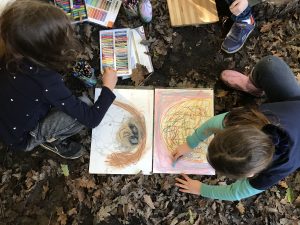by Rowan Salim
There is a hand gesture which the FWG children made up about 4 years ago to help bring people’s attention back to the meeting. It’s called the ‘cannon ball’ and you do it by putting the tips of your fingers together into a ball above your head. I’m not a fan of the name, but I like the gesture. 10 fingers, 1 circle/ball. The cannon ball in a way symbolizes the meeting. Each person an individual, and when we sit together in a circle, we are one.

After 5 years of being at FWG, I’ve been reflecting about the children’s meeting. The meeting runs rather well! I personally love it. Sara A at the last info meeting reminded me that I once described it as the heartbeat of our community. I feel like it’s the time when we all get together, we see each other, we make plans together, listen to our problems, work together to solve them, and hear each other in times of trouble and joy and ecstasy.
When I started at Free We Grow, and was just getting my head around what it means to hold a children’s meeting and what compassionate communication looks like, I kept coming across the phrase: “Speaking from the I”. I used it, maybe once or twice, but then it slipped from my lingo. In Roundspeak, Bas Rosenbrand uses the term ‘keep it with yourself’.
In a group, there are lots of feelings. Imagine sitting in a circle, each person their own ball of feelings, emotions, needs, desires. Each with their own need for play and for rest and for laughter and for satiating curiosity and for the sweet taste of sugar on their lips. Sometimes, those needs are aligned – I expect we pretty much all love the taste of sugar on our lips! But sometimes, those needs are not aligned. One wants more rough and tumble play, one wants quiet, one wants to dive heart and soul into drawing, one wants the strategy of chess, one wants to be earth spirit, one wants all of the above.
When we share our plans, we sit in a circle and we share our I’s. we notice that others have similar I’s to us, and we make a plan to try to get everyone’s needs and desires met.
And then it gets more complicated. Once plans are done, we talk about ‘problems’ or community issues.
Here, speaking from the I requires a different level of tuning into feelings. How do ‘I’ feel when it’s loud indoors? How do I feel when I’m asked to be quiet but I’m having so much fun being loud. How do I feel when I want the taste of sugar on my tongue, but someone in the meeting is saying that maybe it’s not a good idea to have marshmallows every day. What was it about sugar anyway that makes it not a great thing? How do I feel about the tree being cut down? How do I feel when I hear that my friend is tired and didn’t sleep well last night?
In all these discussions, in the circle, we sit as individuals, and as a whole. We share our own, we bring ourselves in, and we listen with our minds and our bodies.
Over the years at Free We Grow, I’ve been trying to tune in and notice patterns and tendencies of culture creation. It’s been such a joy and an honor to continue to be involved with Free We Grow through two different communities, the one we started with 5 years ago, and this new community with so many new people this year. The culture at FWG is always shifting as new people come and seasoned people go. The culture is shaped by people’s interests and cares. During the day this often happens by the passion people bring to play and conversation. It’s by their interest and their verve, and their humor and their sorrows! It’s by the things they choose to talk about and the things that they value and bring our attention to, and the things they don’t.
The meeting is also one of the forums in which culture is created. Facilitating the space such that individual voices don’t dominate and and shape trajectories is critical in opening space for everyone to be involved in culture creation.
Speaking from the I isn’t always easy. In fact, out of everyone, I probably find it the hardest. There’s something that happens where individuals with longevity or experience, feel like they just might have more power and influence. I catch myself doing this sometimes – suddenly I’m expressing my feelings and preferences using ‘we’ rather than ‘I’. We do things this way. We should do that. It’s temptingly easy to slip into this habit and it’s an active pastime to keep it in check!
Seeing power, in all its manifestations can help to level the playing field. Having simple shared principles, like ‘speaking from the I’, can help us pay attention and call out power play. This doesn’t mean that experience is ignored or negated, but rather, it allows us to hear and learn from experience, while embracing diversity and difference, and always being open to what’s novel. And that, is exciting.
